In days gone by, hearing the word ‘transparency’ in the fashion world might have conjured images of scantily clad runway models or perhaps a new opaque mesh fabric hot off the ‘press’. But the way the B Corp movement talks about transparency is a little different — it’s about impact on the world and not only meeting high standards of social and environmental performance, but being prepared to be held accountable for it.
As Fashion Revolution Week descends, we look at the rise in ethical and slow fashion, including how several B Corps in the rag trade are minimising their environmental footprint and making their impact traceable and transparent.
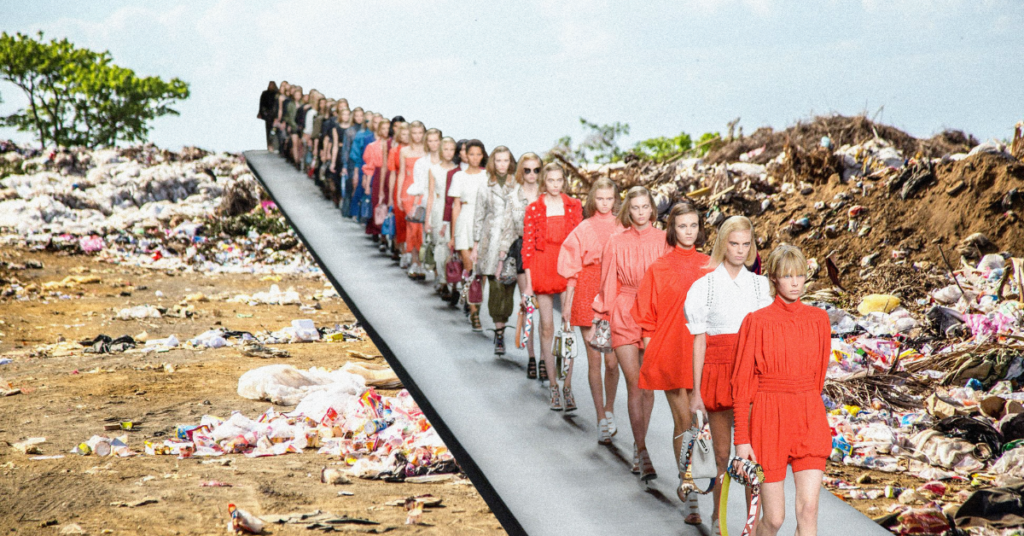
Keeping us clothed doesn’t come cheap
The impact of fast fashion on the planet is devastating and far-reaching, with millions of tonnes of clothes being thrown into landfill annually. Across the world, the equivalent of a garbage truck load of clothes is burnt or buried in landfill every second. You read that right — every second. In Australia and Aotearoa New Zealand, 67 kilograms of clothing per person is discarded into landfill each year.
Up to 85 per cent of textiles go into landfills each year — enough to fill the Sydney Harbour annually. And there are a further 500,000 tons of microfibers released into the ocean each year just from washing clothes alone. Make no mistake — waste is a design flaw.
Apart from the waste it creates, fashion is also highly resource-intensive, with clothing manufacturers relying heavily on water, energy, raw materials, and chemicals to produce their wares, all of which have a significant negative impact on the environment.
“Throughout the entire fashion supply chain, natural resources are extracted, habitats are exploited, toxic emissions are produced, water is polluted and waste is carelessly dumped.”
— fashionrevolution.org
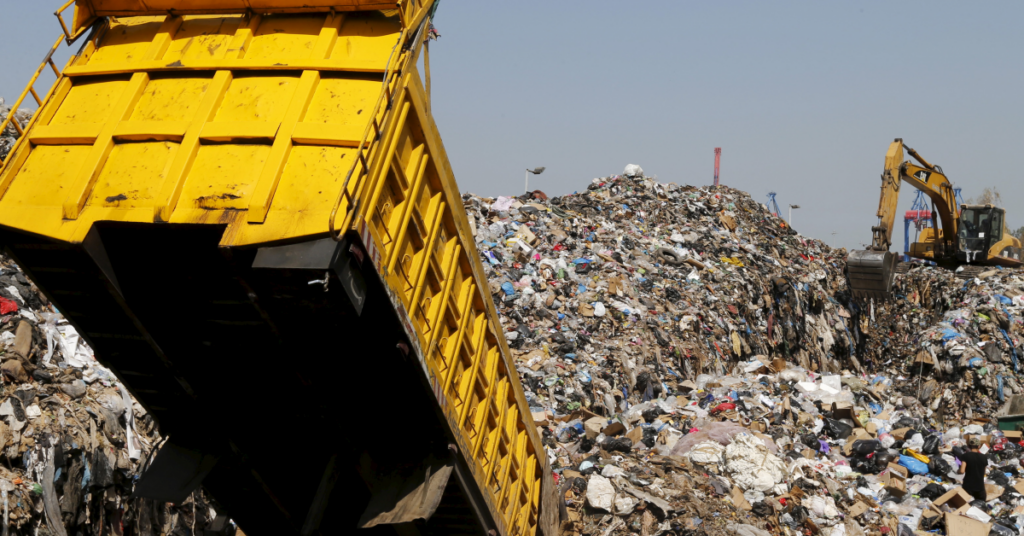
Image: REUTERS/Mohamed Azakir
As one of the largest laboured industries in the world, there are an estimated 1 in 6 people involved in making the clothes we wear. And particularly since the collapse of the Rana Plaza clothing manufacturing complex in Bangladesh in 2013 — the world began to wake up to the dangers of fast fashion.
This all adds up to one very unstylish fact: the fashion industry is one of the largest polluters in the global economy; a seasonable eco-disaster that disproportionately impacts those who can least afford it.
How widespread is waste in the fashion industry? What can we do as consumers and businesses to model more traceable and transparent norms? And who is paving the (run)way for a new economic system?
A rising tide lifts the slow fashion boat
At its core, the rise of ethical and slow fashion reflects a growing awareness of the need for more sustainable and socially responsible practices in the fashion industry. Emphasising quality and durability over fast and disposable — this shift to leave behind an old-fashioned capitalist system is driven by increasingly conscious businesses and consumers demanding better from an industry that has let trends trump transparency for too long.

Image: diego_torres from pixabay
We can no longer turn a blind eye to the environmental and social impact of keeping up with fast fashion trends. Instead, B Corps are finding new and inventive ways every day to meet fashion’s waste problem head-on and seize every opportunity to do things better, developing innovative solutions designed to address seemingly insurmountable global challenges.
Since the movement’s inception, there has been a veritable spool of fashion brands in the B Corp ranks, creating change from the inside out. However, alongside the finance industry, the rise in fashion brands seeking certification has grown significantly since the beginning of the pandemic.
According to The Glossary: when you’re trying to spot truly sustainable brands, there’s one label you need to look out for, and that’s B Corp Certification. And while it’s tempting to see becoming a B Corp as trendy or that sustainability is fashionable right now — make no mistake, doing everything we can, in every industry we can, to tackle climate change and human slavery, is serious business. And it’s heartening to see the vast number of B Corp fashion brands who are now incorporating more sustainable and ethical practices into their operations. Because — even if it’s cheap for you — it always costs someone (or something).

Image: The Common Good Company
How B Corps are changing the world, one innovation at a time ↗
Whether it be through eco-friendly materials, reducing waste, ensuring fair and safe labour practices, or adopting circular economy models, this movement is shifting the global economy to one that prioritises innovation and regeneration over profit and avarice.
B Corps leading the fashion revolution
From the B Corp Climate Collective — a group of Certified B Corporations and other businesses working with our network of B Lab and Sistema B organisations to address the current climate trajectory — to tools like the Climate Justice Playbook for Business and B Climate Tools Base, the B Corp movement is making important strides to tackle what many see as the greatest challenge of our time.
And it is against this backdrop that we acknowledge and spotlight the growing number of B Corps actively working to reduce their environmental impact and increase climate justice through fashion.
With greater transparency in supply chains, fairer wages for workers, and increasing consciousness over the lifecycle of our clothing — what are some of the other ways that B Corps are leading the fashion revolution?
- Taking a circular, waste-free approach and using sustainable or biodegradable materials
- Reducing greenhouse gas emissions, using renewable energy sources and minimising water and ‘virgin’ materials usage
- Operating at a smaller scale or using highly tailored and bespoke processes
- Prioritising transparency in their supply chain — with better accountability and traceability through technology like blockchain
- Promoting fair wages and engaging all stakeholders
- Increasing consumer knowledge through campaigns like #whomademyclothes
- Innovating in their business models and providing more planet-friendly alternatives to fast fashion through clothing rental
- Creating pieces that are ‘easy wear, easy care’ or finding creative ways to combat greenwashing or over-consumption through ‘Green Friday’
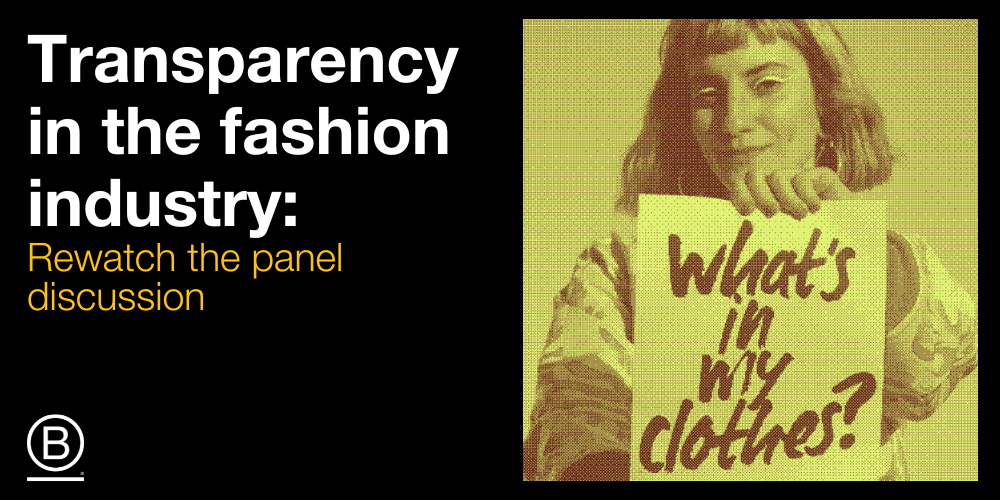
Transparency in the fashion industry: Rewatch the panel discussion ↗
Climb aboard the block-train
One of the most promising developments that has the potential to increase transparency, accountability, and sustainability throughout the entire supply chain is blockchain technology.
By creating a decentralised, tamper-proof system for tracking every step of the production process, eco-conscious brands can more easily verify the authenticity and sustainability of the products they purchase.
Effectively, this digital ledger system records every transaction between suppliers, manufacturers, and retailers, providing a transparent and immutable record of the entire supply chain, allowing us all — both consumers, businesses and investors alike — to trace a product’s journey from raw materials to finished product.
Did you know that a garment purchased in Australia or Aotearoa New Zealand has likely passed through 100 pairs of hands before it reaches you, the wearer?
— Baptist World Aid
Fashion-forward brands are also using blockchain technology to assign each product a unique digital identity that includes information about its origin, materials, and manufacturing process. This enables consumers to easily access information about the product’s sustainability and environmental impact, and also helps to prevent counterfeiting.
Why is this especially important? According to Good On You, some brands have argued that destroying stock protects them against counterfeiting, an enormous, illegal industry worth US$450 billion.

Image: GlamCorner
Search ‘fashion’ in the B Corp Directory this Earth month and beyond ↗
Impactful, innovative intimates
When we talk about curating a conscious wardrobe, sometimes our undies can be overlooked, but we can’t underestimate the potential power of these unsung everyday essentials.
B Corps in the personal care space, like Aotearoa New Zealand-based AWWA, are creating more mindful options, prioritising organic or recycled fibres and partnering with like-minded ethical factories.
But the most impressive element of these impactful intimates is their innovative absorbent design that offers a reusable and convenient alternative to single-use period and incontinence products.
“We [want] to advocate for, break down the barriers, and unpack the stigma around periods that we have all faced. To create a more empowering, more sustainable, and a more beautiful future.”
— AWWA
Plus, every purchase supports the proudly indigenous-owned, female-founded brand’s efforts to combat period poverty through product donations.
— AWWA
“Everybody should have the opportunity to manage their periods with dignity.”
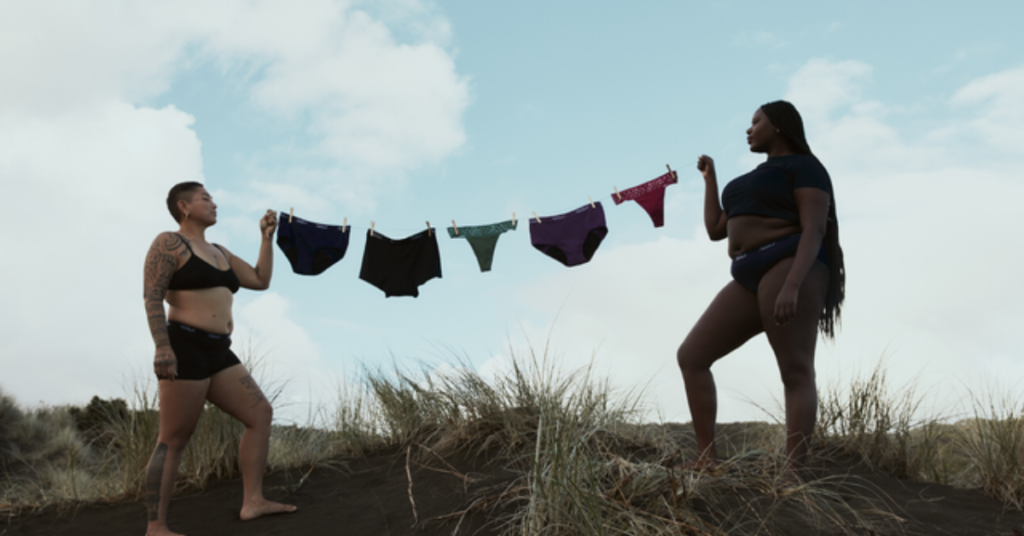
Image: AWWA
Back to bassike
Built on the belief that supporting local makers and valuing organic and natural fabrics is not only good business but good for the world, Aussie B Corp bassike has been busy challenging the fashion industry’s fleeting and ‘trendy’ status quo for a decade and a half.
With over 95 per cent of clothes made in Australia, the label prides itself on having a low carbon footprint and short supply chain. Wanting to set a new precedent in the fashion industry and mitigate the fashion industry’s landfill problem, bassike is currently on track to reduce excess raw materials by 50 per cent by 2025.
“The fashion supply chain is complex. Going beyond legalities, we work closely with our partners to ensure they uphold ethical standards in areas such as animal welfare, energy efficiency, material sourcing, chemical and water use, waste, reuse and recycling.”
Bassike have also created their own Sustainable Ethical Manufacturing Index (SEMI), which enables them to audit garments at every stage of the production process. This not only ensures that everything meets their high sustainable standards but it informs future designs, highlights areas for improvement and provides a product ‘health check’ on the road to continuous improvement.

Image: bassike
A vessel for change
For Kowtow founder Gosia Piatek, fashion is currently facing the largest zeitgeist-driven transition to sustainable practice in human history. Accordingly, Kowtow has been committed to preserving and protecting the planet and its people since day one.
A seed-to-garment brand made entirely from Fairtrade organic cotton, this B Corp from Aotearoa New Zealand believes that clothing is a vessel for much bigger change towards a healthier planet and a fairer world.
Determined to create a positive environmental contribution, Kowtow works with nature to provide a natural and circular clothing solution, from Global Organic Textile Standard (GOTS) approved processes, inks and dyes, to partnerships with Worldwide Responsible Accredited Production (WRAP) certified manufacturers.

Image: Kowtow clothing
Bow down – fairtrade and organic clothing with label Kowtow ↗
With the aim of ‘building back fairer’ to ensure the health and safety of workers in an industry that has done this poorly for so long, they frequently use circular thinking in design and production process, taking a reductive approach to eliminate unnecessary components and reduce waste.
“Two-thirds of the fashion industry, comprising mostly small to medium-sized players, are the worst unethical and unsustainable practice offenders. However, it is unrealistic to put the onus entirely on companies and brands without recognising the power of consumers’ responsible decisions creating tangible change as part of a wider interconnected ecosystem.”
Starting the fashion revolution
For B Corps like Outland Denim, fashion is in desperate need of a revolution.
“In solidarity with and in memory of the 1,134 garment workers who perished in the Rana Plaza garment factory collapse in 2013, we always ask the hard questions. Among the rubble was clothing being made for brands that we wear every day. With these horrific images played out on news feeds around the world, the dirty side of the fashion industry was no longer out of sight and out of mind.”
Building their business model around providing stable employment, a living wage, holistic support, and a safe workplace for women who had experienced human trafficking, exploitation, or abuse – they don’t shy away from asking the hard questions: Who wove the fabric? Who dyed it? Who picked the cotton? And they are also always reflecting on the ongoing effect of COVID-19 on workers across the full fashion supply chain.

Image: Outland Denim
“COVID-19 has disproportionately impacted people who are already vulnerable, like garment workers, and between March and May 2020, the world’s 50 million garment workers lost wages totalling USD$5.79 billion.”
In 2021, Outland Denim was proud to share evidence of the complete journey of their denim from Tier 1 (production) to Tier 5 (the cottonseed) as well as the impact of their approach. It’s not an easy path, but it is worth it. And in true B Corp-style, they are always seeking to do better, to push forward, and plough new ground towards creating a more economic and ecologically sustainable business model.
Pioneering industry change
Manufacturers and retailers themselves generate around 13 million tons of textile waste every year. Why so much? Largely because they overproduce: every season about 30% of the clothes produced are never sold.
One of the most challenging things about running a business in the fashion industry is the task of predicting, a year in advance, what sizes and styles are going to sell so that you can order them in large minimum quantities — and this was the catalyst for starting Citizen Wolf.
Started in 2015, this fierce brand has pioneered a technology called Magic Fit®, which uses customers’ height, weight and age to dynamically generate their unique T-shirt. With an accuracy of 95 per cent for fit, their return rates are less than a quarter of the industry average.

Image: Citizen Wolf
Hungry for change – how B Corp Citizen Wolf is turning fashion on its thread ↗
With a local supply chain and production footprint, they design clothing to last for years and produce garments with half the carbon emissions, compared to traditional mass production.
“We have our own factory. It’s designed to be open with a shop at the front, so you can come and visit us and see who’s making your clothing and their working conditions. It makes us as transparent as we can be in an industry where all of this is usually hidden.”
A big part of their DNA is that they don’t believe the status quo is good enough. And so, they aren’t afraid of challenging it, constantly, to create something better that didn’t exist before. The biggest impact they believe they can make is by showing the fashion industry that there’s an alternative to ‘business as usual’, and that this way is better for people, planet and profit.
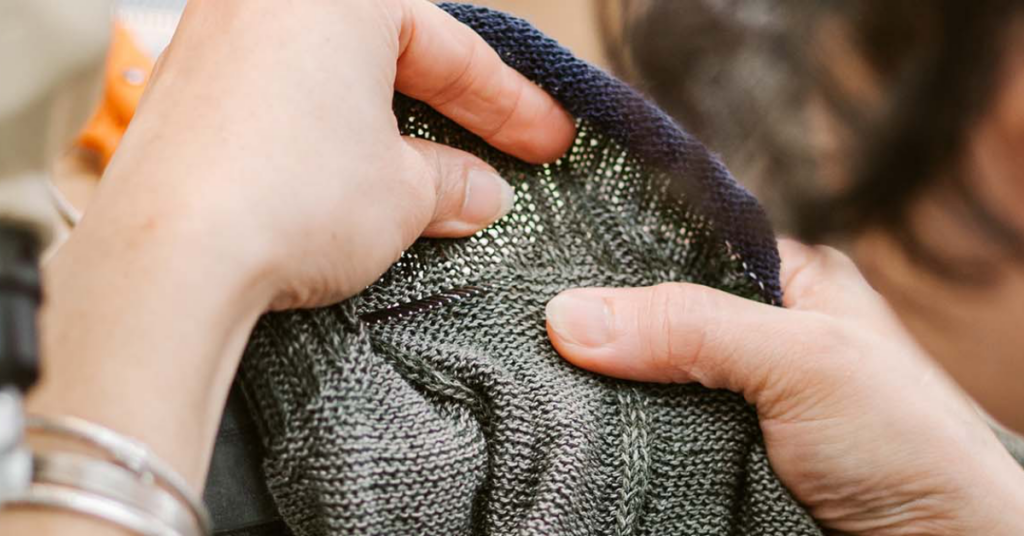
Nine nifty alternatives to help you make every month Earth Month ↗
Sustainable never goes out of style
While the negative impacts of our consumerist society weighs heavily on many of our shoulders, and as consumers we play a crucial role in improving the industry and holding it accountable — for change on the scale we need, it’s businesses and governments that will make the biggest difference.
As businesses, we must address the systemic injustice and waste associated with the fashion industry, not just rely on the behaviours of individual consumers, and make more sustainable and responsible practices the rule, not the exception.
Efforts to promote climate justice must centre the voices of those most affected by its impacts. In the fashion industry, this means centring the voices of those making and manufacturing clothes, and living with the waste.
It means reducing water use and emissions. It means aligning operations with the Sustainable Development Goals (SDGs). It means reducing inequality through circular practices.
And we need to usher in a future for the fashion industry that is traceable and transparent, dignified, creative, and brings about greater climate justice and fair trade for all.
Download B Lab’s Climate Justice Playbook for Business here, or use the free B Corp Directory to discover fashion and apparel B Corps.

